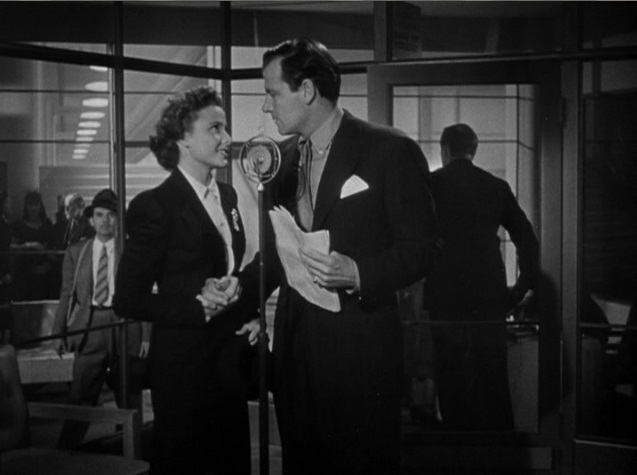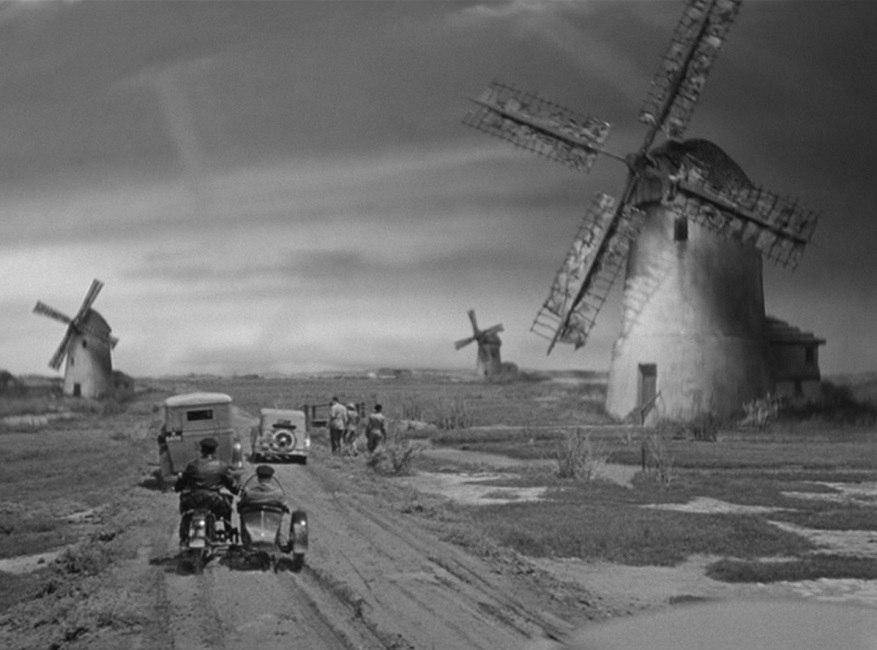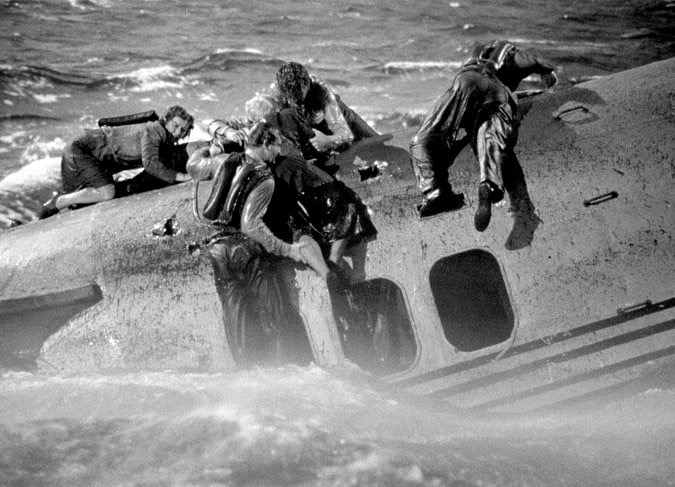| Doug Carmoody |

Foreign Correspondent plays at the Heights Theater on Thursday, April 3rd, as part of our collaboration on the 2025 Hitchcock Film Festival. For tickets, showtimes, and other series information, visit trylon.org.
Antebellum Filmmaking
Alfred Hitchcock’s British films trade heavily in spycraft and international intrigue, but lightly in specificity. Each of The Man Who Knew Too Much, The 39 Steps, and Sabotage feature spy rings embedded in Britain, dedicated to extracting British secrets or terrorizing British citizens.
These films render the identities and motivations of the spies opaquely, preferring to focus instead on the psychological architecture of the narrative. By directing the audience away from the political, Hitchcock allows us to sink more deeply into the affective dimension of his filmmaking—soaking in the sense of guilt generated by an accusation, the sense of fear generated by the pursuit of the police.
All we really know of the villains is that they are anti-British, and often vaguely foreign. The resulting narratives are obliquely xenophobic—not out of any actual conviction, but rather, a desire to sketch the story in the shortest hand possible.
This sense of shorthand characterized Hitchcock’s British works, which were typically nasty, brutish, and short. These were the works of a master on a lean budget, rarely exceeding 90 minutes in length, interspersing bravura visual sequences with moments of curt storytelling.
Running Out on the War
After a period of mutual flirtation, Hollywood finally imported Hitchcock in 1939. The director was motivated by aesthetic opportunity rather than political circumstance—he had made over 20 films in the comparatively threadbare British industry, attaining a level of commercial success that made him a very big fish in a very small pond. Nevertheless, Hitch inked his seven-year contract with mega-producer David Selznick on the immediate eve of the second World War. He left London just a year before the Blitz began.
As a result, the outset of Hitchcock’s Hollywood journey was thoroughly entwined with the international mood at the outset of World War 2. In moving from an early combatant country to the neutral U.S., Hitchcock opened himself to criticism from the British. Former producer Michael Balcon was quick to take the opening, identifying Hitchcock as a “plump young junior technician […] whom I promoted from department to department” before labelling him a “deserter” for abandoning Britain.1
Hitch himself assumed a hefty share of this guilt, later telling Truffaut “I was both overweight and overage for military service. I knew that if I did nothing I’d regret it for the rest of my life.” This particular quote was made in reference to two pure propaganda films that Hitchcock would eventually produce under the employ of the British Ministry of Information. But before jumping into the deep end, he tested the waters of propagandistic filmmaking. This is the context in which Hitchcock directed his second Hollywood film: Foreign Correspondent.
Muckraking in Holland
Foreign Correspondent takes Hitchcock’s well-honed espionage recipe and tries to incorporate explicit geopolitical context and even jingoistic messaging. The political angle is primarily explored through the outlook of our titular foreign correspondent, an American journalist named John Jones, whose editor ships him overseas to find out what is going on in Europe. Through Jones, who is first ignorant of and then activated against the German threat, the audience finds political orientation.
The film’s opening dedication insists upon the significance of its hero, presenting the audience with an overwrought ode to “those forthright ones who early saw the clouds of war while many of us at home were seeing rainbows… To those clear-headed ones who now stand like recording angels among the dead and dying… To the Foreign Correspondents.” But instead of showing angels, the opening scene reveals Jones as a New York City reporter with no sense for international affairs.
The narrative of the film largely centers on the beatification of John Jones; the process by which this classic Hollywood scoundrel style reporter might ascend to the status of Foreign Correspondent. While the execution is a bit uneven (the film boasts a fourteen person writing staff that sometimes feels like twenty-eight),2 the premise makes sense—the film is building a new American myth out of familiar clay.
The infusion of topical political content feels similarly inconsistent at times. Because it largely focuses on the buildup to the war, the film has the liberty to deal in specificity only at convenient moments. Much of it still works with vague Hitchcockian archetypes—a broadly brushed “Universal Peace Party” featuring ambiguously coded nationalities (Dutch, Latvian, a villainous Austrian), certainly no mention of the Nazi persecution of the Jews. At one point Jones pokes fun at this tapestry, asking his editor why he is interviewing a Dutch diplomat instead of Hitler.


Despite the confused writing, the film tracks Jones’s awakening well on a visual level. The settings neatly move from classic adventure film fare (replete with matte painted backgrounds) into expensive war movie set pieces.
Appropriately to both Hitchcock’s thematic proclivities and Jones’s scruffy characterization, our journalist initially gets involved with “the war” by following his lower passions. After looking into an initial lead on a European diplomat, he finds himself distracted with a Carol Fisher, a young peace activist.
Carol quickly becomes a fulcrum on which the moral value of the story turns—will Jones spend his time in Europe chasing leads or tail? Jones’s predecessor in his post appears in this respect like a Ghost of Foreign Correspondent’s Future: the aging journalist spends much of his stipend on liquid lunches and sex workers.
Jones witnesses the seeming murder of a diplomat and begins, through dogged journalist instinct, to unwind a conspiracy among the peace advocacy group. Eventually he even insists that he “can’t run out on the war”—a line that positions him as a metatextual foil to Hitchcock himself, who crossed the Atlantic at a similar time, moving in the opposite direction. Our protagonist seems to be finding a higher calling. But when Carol’s father is revealed to be the lead conspirator, Jones has to choose between the truth and his fledgling romance.
Hitchcock Does Hollywood
Resolving this type of setup is only possible with a healthy dose of Hollywood cliché. In this case, Hitchcock and his screenwriters opt to stuff Carol Fisher full of thematic significance, preparing for her sacrifice to bring about such resolution. Placing this kind of narrative weight onto leading women was not a new plot device, either to Hollywood or to Hitchcock, but the level of excess here still deserves note.
Not only does Carol end up being the person who convinces Jones to remain faithful to his duties as Foreign Correspondent, she is also tasked with explicating the film’s nativist undertones.
After his great adventure, Jones still cannot bring himself to out Carol’s father and tarnish her reputation with “a scandal.” Luckily, Carol begs John to scandalize her, explaining “my father fought for his country his way. […] I have to fight for my country.” Her explanation is load bearing on three separate levels.
First, her willingness to self sacrifice allows Jones to fulfill his heroic duty. Second, she explains why her father was engaged in espionage: it’s a natural course of action if you are an Austrian living in Britain. This speech gives us the explicit form of the latent xenophobia that Hitchcock’s British films had only previously hinted towards.
Finally, Carol’s speech gives a call to action on these same nativist grounds. Because her father acted for his country, she must act for hers. This call serves the dual purpose of modeling nationalist civic duty to the audience and outlining the specifically nativist terms of the film’s notion of citizenship. Because Carol was born in England, she can be trusted to assimilate. While the “other” country in question is Austria, this formulation feels sinister in the context of the Japanese internment program that the United States undertook two years after the film’s release.
Carol’s speech also foregrounds Foreign Correspondent’s denouement, an ending that was tacked on after Hitchcock caught word of The Blitz. In this final sequence, a now-sanctified (and sanctimonious) John Jones sends a message straight to America from a besieged London radio tower. The message is a call to war, which forms a nice bookend with the overwrought opening dedication: “It’s as if the lights were out everywhere except in America. Keep those lights burning. Cover them with steel, ring them with guns, build a canopy of battleships and bombing planes around them.”
David Selznick famously wanted to end Hitchcock’s first Hollywood movie, Rebecca, on a shot featuring a plume of smoke in the shape of an “R” (presumably to remind audiences that the central conflict was about a woman named “Rebecca”). Hitchcock was reportedly aghast that someone would try to end a film on such an obvious note. Selznick didn’t get his way in Rebecca, but it’s hard to imagine he was dissatisfied with Foreign Correspondent.
A Return to Form
While the heat of war proved enough to draw Hitchcock into a political mode, he didn’t stay there for long. After dedicating the middle years of the 1940s to various flavors of propaganda (Bon Voyage, Aventure Malgache, Lifeboat), he began to retreat into his more psychological, MacGuffin-forward mode of filmmaking. While Notorious deals with ex-Nazi in a plot-wise fashion, the film accesses a far richer, darker psychological register than any of his films since Rebecca.
In fact, both Notorious and Rope can be seen as attempts by Hitchcock to extract an abstract notion of cruelty out of the historical fact of Naziism. The former finds Cary Grant to be a near mirror image of the evil men he pursues. And while the latter doesn’t mention the Nazis overtly, it plumbs Nietzschean tropes in order to grapple with the philosophical foundations of human evil.
By the 1950s, Hitchcock was ready to return fully to the ahistorical mode that characterized his British era. He even remade The Man Who Knew Too Much, 22 years after the initial version, featuring similarly ill-defined antagonists. Despite major differences in scale, North by Northwest plays much like a remake of The 39 Steps, with a disinterested protagonist caught protecting his home country from a nebulously defined act of espionage.
That Hitchcock could literally copy-paste his concern for the national security of Britain to that of the United States only further highlights the loosely held nature of his convictions. His venture into political cinema may have been short lived, but he would spend the rest of his life in Hollywood.
Footnotes
1 “Michael Balcon.” Michael Balcon – The Alfred Hitchcock Wiki. Accessed March 21, 2025. https://the.hitchcock.zone/wiki/Michael_Balcon.
2 Stafford, Jeff, and John M Miller. “The Essentials-Foreign Correspondent.” Turner Classic Movies, July 10, 2006. https://www.tcm.com/tcmdb/title/75400/foreign-correspondent#articles-reviews?articleId=136738.
Edited by Olga Tchepikova-Treon
